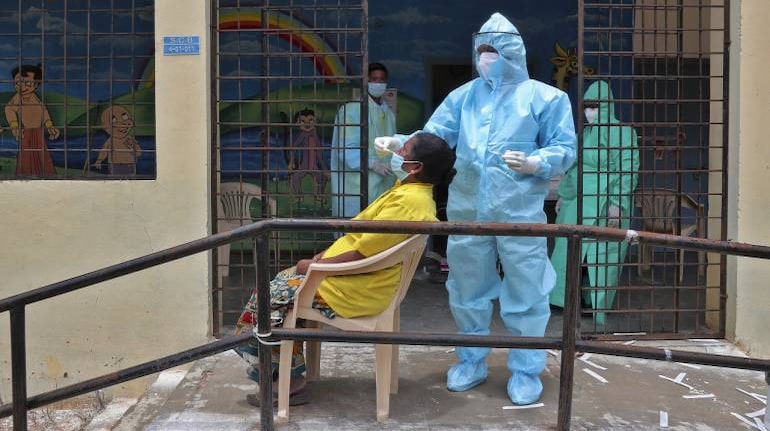Officials said increased testing was one of the main reasons for the surge in cases in the district.
Driven by a surge in COVID-19 cases in the last few days, Pune has become the first district in the country to record more than two lakh cases.
As per data of the Maharashtra government’s health department, the total number of COVID-19 cases in Pune district reached 2,03,468 on Monday after 4,165 more people tested positive for the disease.
Officials said increased testing was one of the main reasons for the surge in cases in the district.
Pune crossed the one lakh-mark on August 5 and in a month’s time, the cases have doubled in the district, according to official figures.
related news
-
Doctor's prescription not mandatory for COVID-19 testing in the national capital, says Delhi HC
-
Kamath Committee report | Tourism industry welcomes recommendations, but fears meeting thresholds will be challenging
-
Opening places of worship with guidelines not practical: Maharashtra govt tells Bombay HC
Compared to Pune, Delhi reported 1,93,526 COVID-19 cases till Monday, while Mumbai recorded 1,57,410 cases.
The COVID-19 positivity rate in Pune is around 22 percent, Collector Rajesh Deshmukh told PTI on Tuesday.
Follow our LIVE blog for the latest updates of the novel coronavirus pandemic
"Currently, Pune district is on top in terms of the number of COVID-19 cases in the country. The reason behind the surge in cases is the aggressive testing strategy adopted by the district administration," he said.
Not just recently, but Pune has been doing aggressive testing for the last two months and the number of cases is bound to increase, he said.
"In fact, no other district is conducting tests the way Pune is doing," he claimed.
Effective contact-tracing, tracking of co-morbid people and isolation of patients have been possible due to the large number of tests, Deshmukh said.
"Testing, tracking and tracing are the main factors behind the surge. Even the results of sero survey (conducted on nearly 1,500 people) found out that 50 per cent people had antibodies," he said.
Despite the number of COVID-19 cases being high, the recovery rate in Pune is encouraging as it is now about 78 per cent, he said.
According to the district administration records, over 1.57 lakh patients have so far been discharged or have recovered from the disease.
Till Monday, 4,651 deaths due to COVID-19 were reported in Pune as against 7,897 in Mumbai.
Deshmukh said the fatality rate in Pune is around 2.3 per cent, which is better compared to Mumbai.
"Our aim is to further bring down the fatality rate by detecting co-morbid patients at an early stage," he said.
District health officer Dr Bhagwan Pawar said the number of cases will further rise in the coming days.
"From today, we are setting up camps in 65 villages where more than 15 cases have been reported. Rapid antigen tests will be conducted on a large population there and as a result, the number of cases will go up," Pawar said.
Deshmukh said besides aggressive testing, the administration is stressing on awareness, strict implementation of social distancing norms and use of masks.
"Considering the rise in cases, there is an emphasis on strengthening healthcare facilities in Pune city and in the district, and medical teams have also been set up to screen people aged above 60 having co-morbid conditions," he added.
While the district administration has claimed that health care facilities have been strengthened, there have been complaints about unavailability of beds in hospitals and other medical aids.
Two jumbo facilities in Pune city and neighbouring Pimpri Chinchwad industrial area were opened last month.
But, the functioning of the facility in Pune came under scanner after allegations of lapses and mismanagement there.
Pune-based Congress leader and former MLC Mohan Joshi blamed the BJP-led Pune Municipal Corporation (PMC) for the increase in number of COVID-19 cases in the city.
"The BJP is in power in the PMC with a strength of 100 corporators. Besides, Girish Bapat of the BJP is a Lok Sabha member from Pune and five MLAs in the city are from the saffron party. Union minister Prakash Javadekar is from Pune, and despite all this, the situation in the city has become critical," Joshi said.
However, BJP MLA Siddharth Shirole, who represents Shivajinagar constituency in Pune, said the number of COVID-19 cases is bound to go up as testing has been increased.
"Our thrust should be on bringing the mortality rate down and for that efforts need to be made," he said.
Talking about Pune's jumbo COVID-19 facility and the alleged mismanagement there, Shirole said it was the state government's decision to set up such facilities in Pune.
"It is the state government's responsibility to ensure proper functioning of the jumbo facilities in Pune and Pimpri Chinchwad. Thrust should be on how to improve the situation at these facilities and how lives of people can be saved," he said.
Follow our full coverage of the coronavirus pandemic here.








